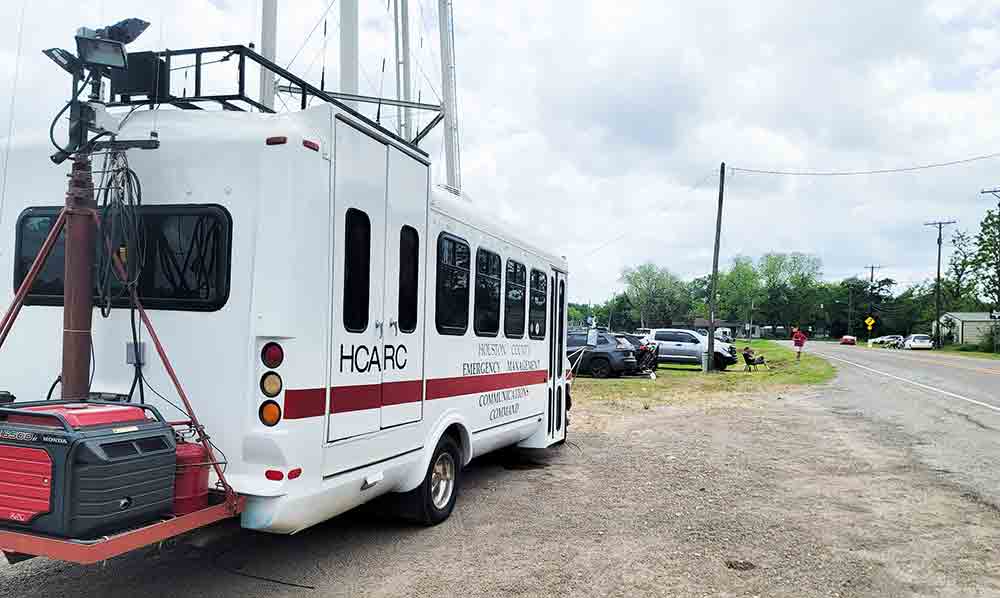 HCARC provided communications for the road course during the Davy Crockett Classic bike race. COURTESY PHOTO
HCARC provided communications for the road course during the Davy Crockett Classic bike race. COURTESY PHOTO
By Jan White
This email address is being protected from spambots. You need JavaScript enabled to view it.
To some, the words “amateur radio operator” invoke the image of a bunch of old guys sitting around talking to each other on improbably complex equipment over VHF and UHF frequencies. To others, amateur radio is considered a geek hobby, earning the undeserved reputation of being “old-fashioned,” and the nickname for the radio operators, “hams,” doesn’t help.
According to The American Radio Relay League (AARL), the label originated in the early 1900s as a rather uncomplimentary jab at fledgling amateur radio operators. In those days, government ships, coastal stations, and amateur operators competed for signal supremacy. Many of those early amateur stations were very powerful, so two amateurs, working with each other across town, could effectively jam all the other operations in the area. Frustrated commercial operators would call the amateurs “hams,” a word coined by the theatrical community to describe unskilled performers. It’s speculated that local amateur operators were unfamiliar with the negative connotation and began using the term to describe themselves. Over the years, the derogatory nature of the original moniker disappeared, but ham stuck.
Fortunately, amateur radio operators are neither outdated, geeky, nor unskilled. Anyone eighteen years or older can obtain a license, but there is an elevated level of training to obtain any license higher than the entry-level “technician” class. Applicants must pass an examination on regulations, electronics, radio theory, and radio operations. After being assigned a call sign, new operators can use their equipment to engage in two-way communications with other operators.
The Houston County Amateur Radio Club ( HCARC ) is a club of licensed amateur radio operators who meet regularly to exchange ideas, improve radio skills, and organize activities and public services such as local and national emergency radio communications in times of disaster.
The HCARC works closely with local, state, and national emergency communications. They are constantly upgrading equipment and honing their skills through regular communications training to meet the needs of our community in times of emergency or disaster. The goal of the HCARC is to be there “when all else fails.”
The Houston County Amateur Radio Club meets at the old National Guard Armory on the second Tuesday of the month at 7:00 pm. The building is located at 600 Bradshaw Street, on the corner of Edministon Dr. and Christy Lane near Davy Crockett Park in Crockett. Anyone who has an interest in amateur radio is welcome. You do not have to be licensed to attend a meeting.
For more information about the Houston County ARC, call (936) 222-1264.
By definition, a ham radio operator is an amateur radio enthusiast. But besides the opportunity to connect with other radio operators locally and worldwide, hams can serve a higher purpose. That “hobby” can be a significant help in the case of natural disasters or other emergencies. Many operators volunteer their time, equipment, and knowledge to support local, regional and international response and relief works during times of disaster.
Ham radio operators can often keep their communication going when other methods have failed. Most communications systems run on the same commercial electric power that runs our homes and workplaces. If that power fails, systems without a generator or battery backup are out of commission. Even those backup systems, if not maintained, will not work, and improperly maintained batteries can quickly be exhausted. And no power means no communication.
Properly prepared hams can make available power sources last longer and continue operating for extended periods. Some local and national clubs support specific agencies, like the Sheriff’s Department or the American Red Cross, or assist area hospitals. Others may offer their services more broadly to any government or non-government relief organization in need of assistance.
You are a guest
or post as a guest
Be the first to comment.

